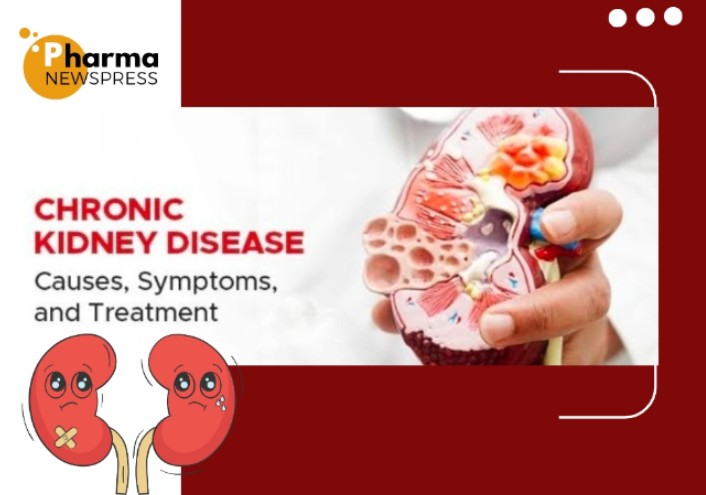🔷Kidney disease means your kidneys aren’t working properly and are beginning to lose their function. Chronic kidney disease (CKD) worsens over time. High blood pressure and diabetes are two common causes of CKD. There’s no cure for CKD, but you can take steps to preserve function for as long as possible. Late-stage kidney disease requires dialysis or a kidney transplant.
What is chronic kidney disease?
🧪Chronic kidney disease (CKD and chronic renal disease) means that there’s damage to your kidneys and they aren’t working as well as they should. Your kidneys are like a filter in your body — filtering out wastes, toxins and extra water from your blood. They also help with other functions like bone and red blood cell health. When your kidneys begin to lose their function, they can’t filter waste, which means the waste builds up in your blood.
🌡️Kidney disease is called “chronic” because kidney function slowly decreases over time. CKD can lead to kidney failure, which is also called end-stage kidney disease. Not everyone with CKD will develop kidney failure, but the disease will often worsen without treatment. There’s no cure for chronic kidney disease. But there are steps you can take to slow kidney damage. Treatments like dialysis and transplantation are options for kidney failure (end-stage kidney disease).
What are the 5 stages of chronic kidney disease?
Chronic kidney disease (CKD) is classified into five stages based on the level of kidney function, specifically the estimated glomerular filtration rate (eGFR). The stages are:
1. Stage 1: Normal or High Kidney Function
eGFR: 90 or higher (ml/min/1.73 m²)
Kidney function is normal or slightly above normal, but there may be signs of kidney damage (e.g., protein in urine, structural abnormalities).
2. Stage 2: Mild Kidney Damage
eGFR: 60–89
Kidney function is mildly reduced, and there may be evidence of kidney damage, but symptoms are usually not noticeable at this stage.
3. Stage 3: Moderate Kidney Damage
eGFR: 30–59
Kidney function is moderately reduced, and symptoms may start to appear, such as fatigue, swelling, and changes in urine output. Treatment is typically focused on slowing progression.
4. Stage 4: Severe Kidney Damage
eGFR: 15–29
Kidney function is severely reduced. Symptoms become more apparent, and kidney failure is approaching. Preparation for dialysis or a kidney transplant may begin.
5. Stage 5: Kidney Failure (End-Stage Renal Disease)
eGFR: Less than 15
Kidney function is almost completely lost, and dialysis or a kidney transplant is required to sustain life.
These stages help in determining the severity of the disease and the appropriate course of treatment.
How do you know if your kidneys are struggling?
You may not know your kidneys are struggling. Most people don’t have symptoms of kidney disease in the early stages. That’s why it’s important to attend annual wellness exams with your primary care provider to manage chronic conditions like diabetes or high blood pressure that can lead to kidney disease.
Symptoms and causes ;
In the early stages of kidney disease, you usually don’t have noticeable symptoms. As the disease worsens, symptoms may include:
A need to pee more often.
🔹Tiredness, weakness, low energy level.
🔹Loss of appetite.
🔹Swelling of your hands, feet and ankles.
🔹Shortness of breath.
🔹Foamy or bubbly pee.
🔹Puffy eyes.
🔹Dry and itchy skin.
Management and Treatment;
There’s no cure for chronic kidney disease (CKD), but steps can be taken to preserve your kidney function so they work as long as possible. If you have reduced kidney function:
🔹Make and keep your regular healthcare provider/nephrologist (kidney specialist) visits.
🔹Manage your blood glucose (sugar) if you have diabetes.
🔹Avoid taking painkillers and other medications that may make your kidney disease worse.
🔹Manage your blood pressure levels.
🔹Follow a kidney-friendly diet. Dietary changes may include limiting protein, eating foods that reduce blood cholesterol levels and limiting sodium (salt) and potassium intake.
Medications for kidney disease💊
Depending on the cause of your kidney disease, you may be prescribed one or more medications. Medications your nephrologist may prescribe include:
🔹An angiotensin-converting enzyme (ACE) inhibitor or an angiotensin receptor blocker (ARB) to lower your blood pressure.
🔹 Phosphate binder if your kidneys can’t eliminate phosphate.
🔹A diuretic to help your body eliminate extra fluid.
🔹Medications to lower cholesterol levels.
🔹Erythropoietin to build red blood cells if you’re anemic.


